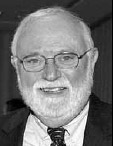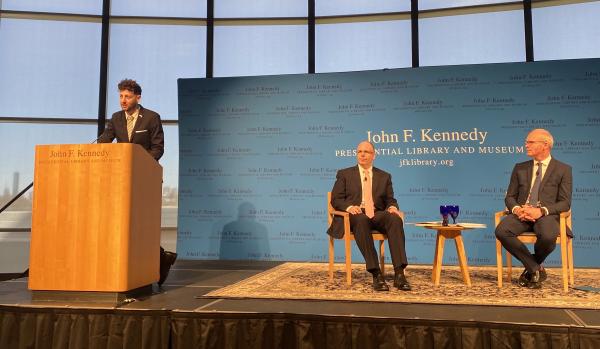
June 14, 2022

Deputy Consul Shane Caffrey introduced Dr Bob Mauro, ctr, and Minister Simon Coveney, T.D. this spring in program at the John F Kennedy Libray & Museum. Photo courtesy Irish Consulate
by Ed Forry, Boston Irish publisher
Simon Coveney, TD, Ireland’s Minister for Foreign Affairs and Defense was among the first guests at the John F. Kennedy Library & Museum when public gatherings were resumed on April 29, participating in a one-hour discussion with Dr. Bob Mauro, director of the Boston College Irish Institute and founding director of BC’s Global Leadership Institute.
The minister was accompanied by Joe Hackett, the secretary general of the Department of Foreign Affairs whose first DFA assignment was as Deputy Consul General in Boston in 1995.
In early April, Coveney had visited Ukraine, where he pledged his country’s support. “Even though Ireland is a militarily neutral country, let me be clear: We are not neutral on this war," the BBC reported he said in a news conference in Kiev. "We are also not neutral on the future of your country."
Coveney was in Boston after a visit to Washington D.C. and a speech to the United Nations Security Council in New York.
In his conversation with Mauro, the minister spoke in detail about his trip to the war zone, and discussed the continuing border dispute in Northern Ireland,
In a Q&A session later that morning, an audience member asked Coveney: “In the past ten years or so we have seen a progressive trajectory in Ireland in terms of reproductive rights, of gay rights, a sort of marginalization of church authority. How does a progressive Ireland inform your job in your position on the world stage?”
Coveney’s lengthy comments offer a revealing perspective into contemporary Ireland. Here is what he said in response:
“Good question, and that allows me to talk about something outside of Northern Ireland and Ukraine. … You know, we ask ourselves the question all the time in the Irish foreign ministry: What can we bring to international debates that can add value from an Irish perspective? We're not a big military power, but we are very active when it comes to peacekeeping. We’re not a big political system, but we try to have a say in global debates on lots of the big issues.
“But to answer your question directly: Foreign policy for us is very much driven by gender equality, by sexual and reproductive rights now. And we both fund that and advocate for that through the UN system primarily, but also within the EU.
“So we try to talk about the journey that Ireland has been on in terms of how it is in Ireland, the debates around divorce, abortion, reproductive rights, gender equality, marriage equality – all of those things have evolved over time in Ireland. And many other countries are at different stages of that journey. We try to use our own mistakes and our own successes in some ways as a case study, to encourage others to make a similar journey.
“I do that all the time when I'm in different countries from a foreign policy perspective. So, I think if you're not leading by example, you're not very credible; in truth, you know, if we're calling for change in other parts of the world, but we haven't managed to deliver it in our own home patch in Ireland, then I think there's a pretty serious credibility problem.
“So the fact that much of the change that you refer to – if you want to call it a liberal journey, or a liberalization journey that Ireland has been on – I hope that that provides a pathway and an inspiration for other countries to follow. Our relationship with the church has changed, but it's still very important in many people's lives. But I think the relationship between the church and state in Ireland now is more appropriate than it has been decades ago. So, yes, I think it's important that we recognize the mistakes that Ireland has made as well as the successes, because we've made many mistakes in that space in the past. But I think if you're honest about that and honest about the journey that you're on and the value system that drives that change well, then you can be credible and, hopefully, influential.
“One of your previous presidents talked in a number of speeches about the soft bigotry of low expectations, which is a quote that I often use when I'm talking to students in schools and universities. It’s around this idea that some people grow up with a perceived label on their back where, even though people might be nice to them, they don't really expect them to achieve very much because of their skin color or because of the school they've gone to, or because of the address that they come from or because of their family history or whatever.
“I often think about that quote in the context of global politics, too, around a sort of a soft bigotry of low expectations coming from small countries that don't really matter. And that actually it's the superpowers that decide everything.
“And I find that as sort of a motivation to force the argument by strength of argument, as opposed to by military might or economic scale, or population size or whatever. And that's the beauty of the European Union, by the way; it makes decisions by and large on the basis of the strength of argument. And there's no reason why Ireland can't be as influential as Germany on that argument or France or Spain or Italy, countries that are multiples of our size. That is why, of course, the UN system for us is really the centerpiece of our foreign policy, because we believe we can win the argument. We don't always succeed, but we can certainly try to influence things for the better.
“So, in the areas that you talk about, actually a lot of it has happened in my political lifetime in the last two decades. I think we have an interesting story to tell, that for other countries, hopefully, can be both inspiring and reassuring in terms of how you build a more tolerant, diverse society.
“You know about close to 20 percent of the population living in Ireland today were not born in Ireland. A decade or two decades ago, that number would have been much, much smaller. Between now and 2040, we are planning to add a million people to the population of our country and 50 percent of that million extra won't have been born in the island of Ireland. So we're planning for a more international, more multicultural, more diverse population, which, of course, is the story of this country, and is a big part of its success. So that's the journey we're on. And hopefully for other countries that are trying to forge a way forward, it can be a case study that can help in political decision making.”
The complete program at the JFK Library may be seen online at jfklibrary.org/events-and-awardsforums04-29-coveney

